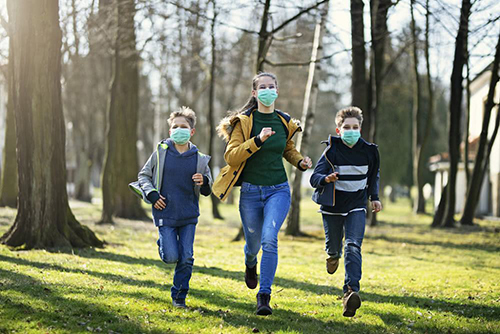Scientific protection against pollen allergy
Spring returns to the earth and flowers are in full bloom. When most people are immersed in the beauty of spring, some people have symptoms such as runny nose, sneezing and itchy eyes, which are often caused by pollen allergy. What is pollen allergy? Which people are susceptible to allergies? How to prevent it? The reporter interviewed relevant experts.

"Pollen allergy refers to an immune response produced by the human body after contacting or inhaling pollen, which leads to allergic symptoms." Yang Yuguang, deputy chief physician of the Department of Dermatology, Fourth Medical Center of PLA General Hospital, said that Artemisia, Platanus, Chenopodiaceae and Cupressaceae pollen are common allergic pollen. Every year, the number of pollen presents two peaks, from mid-March to late April, and from late July to late September, which is also the period when pollen allergy symptoms appear the most.
Yang Yuguang said that people who are susceptible to allergies mainly include people with allergies, people with family allergies, and people who have been exposed to allergens for a long time (such as garden workers and flower farmers). The symptoms of pollen allergy mainly include: skin symptoms including erythema, papules, wheal, accompanied by severe itching; Allergic conjunctivitis such as redness and itching will appear in the eyes; Allergic reactions of respiratory mucosa, including runny nose, sneezing, itchy nose and stuffy nose.
How to treat the symptoms of pollen allergy? Yang Yuguang said that allergens should be cut off first to avoid contact and inhalation of pollen. Antihistamine drugs can be used when allergic symptoms occur all over the body; Patients with dermatitis and urticaria can be externally applied with antipruritic preparations, glucocorticoids or calamine containing phenol; Patients with severe allergic symptoms can be systematically treated with glucocorticoids when necessary, and the symptoms will gradually decrease after improvement.
Cut off allergens is that most effective way to prevent pollen allergy. Yang Yuguang said that in the season with more pollen, try to reduce outdoor activities, or wear effective protective masks, glasses and other protective equipment when going out. Wash the exposed parts such as face and nasal cavity in time after returning home to reduce the residue of allergens. Keep the room clean, clean regularly, close doors and windows, use air purifiers, etc. to reduce the concentration of indoor pollen catkins and reduce the breeding of allergens. In addition, eat more fresh fruits and vegetables and maintain adequate vitamin intake; Exercise properly, enhance physical fitness and improve immunity.
In addition to pollen allergy, there are allergens such as mold, pet hair and mosquitoes in spring. Xiao Minglu, the attending physician of dermatology department of the Fourth Medical Center of the General Hospital of the People’s Liberation Army, said that the humidity is high in spring, and mold is easy to appear at home. It is recommended to keep the room dry and ventilated, and air purifiers can be used to reduce the concentration of mold. In spring, pets change their hair, which is easy to float in the air. People with allergies should avoid touching pets and clean their hair regularly and promptly. Mosquitoes become active in spring. When people with allergies go out, they should pay attention to long clothes and trousers for physical protection, and try to avoid staying in places where mosquitoes are easy to gather, such as rivers, grass and Woods. (Shen Shaotie)
Zhao Xi
]